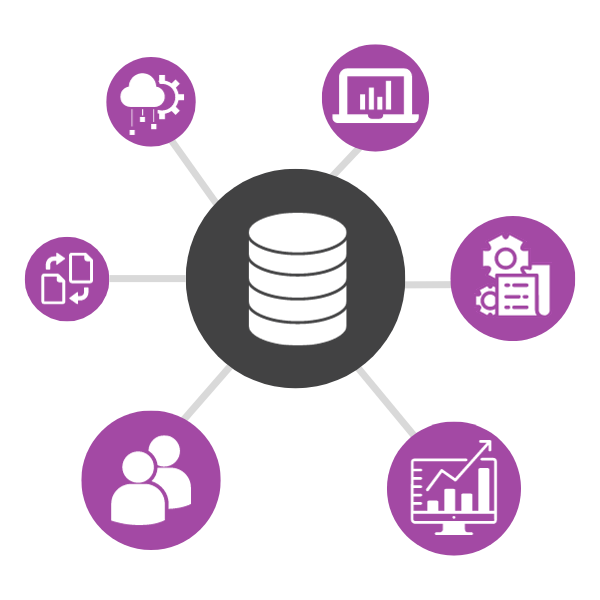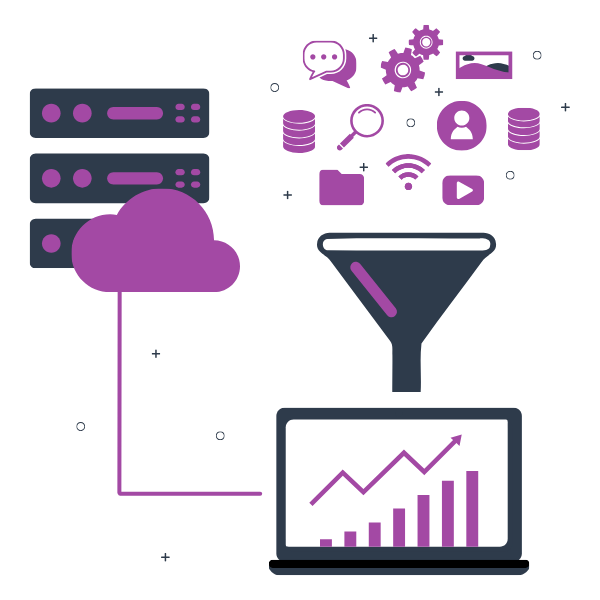Data Integration is so much more than just data synchronisation. It is the process of combining data from different databases or systems into a single, more usable database. It is an important part of any organisation that needs to share information across departments and with external partners. Every second, new data comes into the organisation and for data to be useful, it must be available, accurate, relevant, and up to date for analysis at all the times. This can only happen when data from various systems can communicate promptly and in a standard way. That’s what data integration does best! This article explores some of the benefits of data integration in order to help you decide if it's right for your company.
Streamlined Efficiency & Time Savings
Through data integration, you are able to automate the steps in your existing processes, which allows employees to focus on more complex work. When a company integrates techniques like data integration into their business processes, it significantly cuts down the time it takes to prepare and analyze that data. The automation of unified views also eliminates the need for gathering data manually. The time saved on these tasks can be used for analysis and execution to make an organisation more productive and competitive.
A Unified, Holistic Perspective
Data integration allows organisations to create a holistic view of their data landscape. By combining data from different departments, systems, and sources, businesses can gain a comprehensive understanding of their operations, customers, and market trends.
Error Minimisation
Data integration works to organise data; it identifies issues automatically, uncovers anomalies and removes duplicate information which, as a result, reduces the chance of human error.When data integration is in place, your employees have access to the most accurate and real-time data whenever needed. It also reduces tedious manual work and data manipulation, thereby minimizing errors.
Scalability
As organisations grow and accumulate more data, data integration becomes even more crucial. Scalable data integration solutions can adapt to changing data volumes and sources.

Breaking Down Data Silos
A data silo is a collection of data that’s isolated and typically only accessible by one department. Data silos obstruct companies from gaining deep, actionable insights and create a barrier that limits a total view of the company. There’s a lot to keep up with when it comes to a company’s data resources. To gather the data manually, employees must know every location and account they might want to explore. Plus, they must install all the necessary software before they even begin to ensure their datasets will be accurate and complete. In case, a data repository is added, and that employee is unaware, they will have an incomplete dataset.
Enhanced Data Governance
Data integration often goes hand in hand with data governance practices. It helps establish rules and policies for data management, ensuring that data remains accurate, secure, and compliant.

Fostering Collaboration
Teamwork is a vital part of any modern business. Data integration allows different departments to share data which facilitates transparency and opens the door to cross-departmental collaboration. Employees in every department – and sometimes in disparate physical locations – need access to the company’s data for business projects. Additionally, employees in almost every department are improving and generating data that the rest of the business needs. By integrating data, everyone can access a unified view of the data from the entire organisation. This improves collaboration and unification across the organisation.
Augmented Business Intelligence
Integrated data serves as the foundation for business intelligence and analytics initiatives. These data-driven insights inform and influence an organisation’s tactical business decisions. Analysts and data scientists can perform more advanced and meaningful analyses when they have access to a unified dataset.
Saves Time
Having all the data you need in one centralised area means that you don’t have to spend time trying to access information from multiple, disparate sources. Data integration gives you a unified view of the data that’s needed to perform particular functions, make decisions and action processes.
Smarter Business Decisions
Data integration allows transparent business processes within the enterprise. Data integration systems give the flexibility to use data in different internal systems in whatever way the businesses want. This allows them to understand data clearly. Therefore, any decision regarding business processes can be made quickly and smartly.
Amplified Data Value
Data integration process improves the value of a business’ data over time. As data is integrated into a centralized repository system, quality issues are identified and improvements are implemented, resulting in more accurate data — the foundation for quality analysis.
Improves Employee Efficiency
With data spread across a variety of systems, employees waste valuable time looking for data in different systems. Data integration technology saves billions of dollars in lost productivity each year by centralizing the company’s most important data.
Increases Competitiveness
Companies that ensure data integration in their core business can take advantage of all the data assets and make a positive impact on efficiency by creating more relevant data products.
Strengthened Customer Relations
In today's business world, it is important for companies to have a strong understanding of customer needs and preferences in order to provide them with better products and services. With data integration, you are able to automatically create a historical record that can be used in conjunction with demographic information to gain a deeper understanding of your customer base and provide them with more personalized insights. This approach makes the customer experience more efficient and satisfying for both parties. This type of personalized service has the potential to strengthen relationships as well as help you identify new opportunities for growth.
Cost-Efficiency
Data integration reduces the need for manual tasks by allowing more steps in your process to become automated. Manual processes are time-consuming, expensive, and prone to human error so using automated data integration can reduce costs by eliminating these workflows.
Revenue Generation
Data integration can help you create new revenue streams or expand into new markets by allowing access to more information in your organisation faster. For example, if you're a B2B company that sells to other businesses you could analyze sales data in real-time and provide customized insights to your customers through an integration with a data analytics solution. In this way, you can offer new products and services based on the insights from your existing database.
In a nutshell, data integration plays a pivotal role in modern data-driven organisations. It is a good investment for any business looking to provide their employees with better tools to work with. It not only improves data quality but also unlocks the potential for more informed decision-making, operational efficiency, and competitive advantage. As data continues to grow in volume and complexity, the significance of effective data integration becomes even more pronounced.
Are you prepared to harness the full potential of data?
Whether you're a veteran or just starting out, our team of experts is here to guide you through the intricacies of data engineering tailored to your organisation landscape. Don't miss out on this opportunity to stay ahead of the curve. Contact us today to embark on your journey toward data-driven success.
